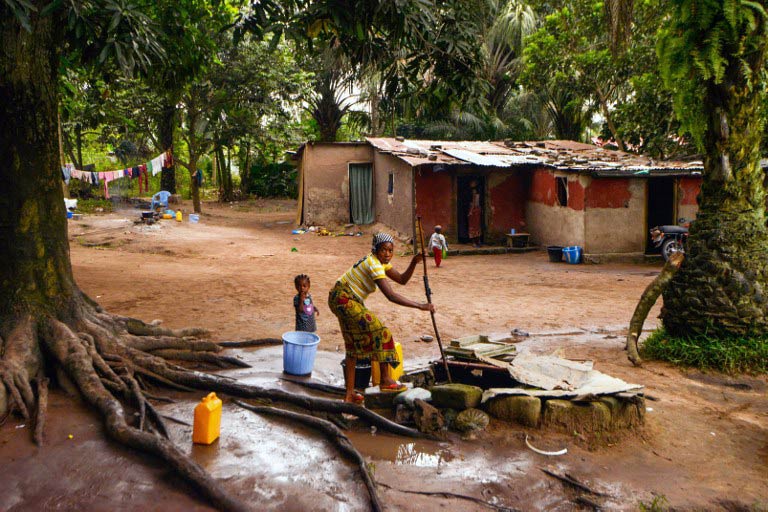In a Congolese cemetery overrun with weeds and rubbish strewn among the graves and banana trees, the living have moved in with the dead – some of them years ago.
For want of money and space, families have built houses out of earth, brick or sheet metal alongside tombs – some of prominent figures like the father of the current first lady – in the Kinsuka cemetery in Kinshasa, the Democratic Republic of Congo’s capital.
As they attempt to lead normal lives in this unlikely setting, the cemetery dwellers, who number at least several hundred, are not only living on the land illegally but also face dangerous sanitary conditions.
“You’re afraid you’re going to dig up a bone,” said 19-year-old Emile as he worked on the foundation for his older brother’s new house just steps away from a well-tended grave.
Should he, or the others, degrade a tombstone they face up to six months in prison, while living without a proper land title could mean a year in jail under the country’s penal code.

Neighbour Bibiche (23) has lived in the cemetery for two years but says it is still an unsettling experience.
“You feel afraid sleeping amidst the graves, but we had no home,” she said. “The cemetery isn’t good, we have no electricity.”
Yet other cemetery residents say they not only have electricity but pay a “bill” to the national power company, SNEL.
Poverty
Despite its vast mineral wealth, two-thirds of the DR Congo’s 68 million people are mired in poverty, exacerbated by back-to-back wars that ravaged the country from 1996 to 2003 and left a complex web of rebel groups still terrorising the eastern provinces.
Finding housing is a constant struggle for many, and large numbers of civilians – and even police and soldiers – have taken to the country’s cemeteries to find a place to call home.
But life among the gravestones is no free ride, explained Therese, a five-year resident of Kinsuka cemetery. The 57-year-old widow paid a local chief to buy four plots of land with her children’s help.
“They cost between $2 500 to $4 000 each,” said Therese, who like all the cemetery residents only gave her first name for fear of reprisal.
Inside her two-room house, the bedroom has a mosquito net but no bed.
“In November, the police came to destroy the houses. They took my things,” she said.
“I had to rebuild my house, but I don’t have the courage to rebuild on my other plots that I wanted to rent out.”
Yet scenes typical of village life can still be found in Kinsuka. The dirt paths are lined with wooden stalls selling food and basic supplies, and children in traditional blue and white kits play football at a Protestant school built inside the graveyard three years ago.
“Today it has about 150 students. Parents pay 78 000 Congolese francs per year, against $300 to $400 dollars elsewhere,” said the school’s director.
In some parts of cemetery the construction of homes has made it harder to locate remaining burial plots. The graveyard was founded in 1978 and is the final resting place of several well-known figures, such as engineer Sita Barnabe Kinsumbu, the father of the DRC’s first lady Olive Lembe Kabila, according to a local burial tax collector.
Public health hazard
Government officials say the homes in Kinsuka and other cemeteries across the country constitute a public health hazard, noting that it takes as long as 50 years after a site’s last burial to ensure the ground is fully decontaminated.
“Sometimes people find a source of water but when you sniff it, it smells like a corpse,” said Dr Benjamin Mavard Kwengani, director of hygiene at Kinshasa’s health ministry.
“We haven’t done a study, but there have been abnormal cases in the (cemetery) communities – diarrhoea and abnormalities that we can’t explain,” he said.
According to Pius Ngoie, an advisor to the urban planning ministry, cemetery villages only continue to exist due to negligence and corruption within the civil service.
“Some of the state’s civil servants … are completely irresponsible” and “fraudulently” sell tracts of land in the cemetery, he said.
The cemetery dwellers are under no illusions that their homes could be razed at any moment.
“One day, a [state] tractor is going to come and knock down the houses and they will lose everything,” said Peter, whose father and grandfather are buried in Kinsuka.
His words turned out to be prophetic. Just a few days later, soldiers arrived to destroy some of the homes built on the remains of this final resting place.
Habibou Bangré for AFP


